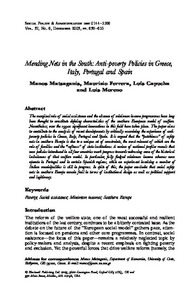Mending nets in the South: anti-poverty policies in Greece, Italy, Portugal and Spain

Matsaganis, Manos ; Ferrera, Maurizio ; Capucha, Luis ; Moreno, Luis
Social Policy & Administration
2003
37
6
639-655
guaranteed income ; poverty alleviation ; social assistance ; welfare state
Greece ; Italy ; Portugal ; Spain
Social protection
fttp://dx.doir.org/10.1111/1467-9515.00363
English
Bibliogr.
"The marginal role of social assistance and the absence of minimum income programmes have long been thought to constitute defining characteristics of the southern European model of welfare. Nevertheless, over the 1990s significant innovations in this field have taken place. The paper aims to contribute to the analysis of recent developments by critically examining the experience of anti-poverty policies in Greece, Italy, Portugal and Spain. It is argued that the “patchiness” of safety nets in southern Europe is due to a unique set of constraints, the most relevant of which are the role of families and the “softness” of state institutions. A review of national profiles reveals that new policies introduced in all four countries mark progress towards redressing some of the historical imbalances of that welfare model. In particular, fully fledged minimum income schemes now operate in Portugal and in certain Spanish regions, while an experiment involving a number of Italian municipalities is still in progress. In spite of this, the paper concludes that social safety nets in southern Europe remain frail in terms of institutional design as well as political support and legitimacy."
Digital
The ETUI is co-funded by the European Union. Views and opinions expressed are however those of the author(s) only and do not necessarily reflect those of the European Union or the ETUI.